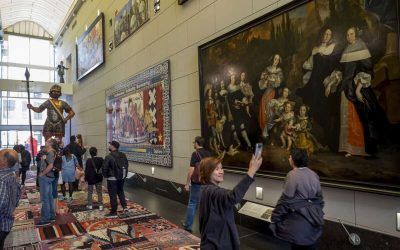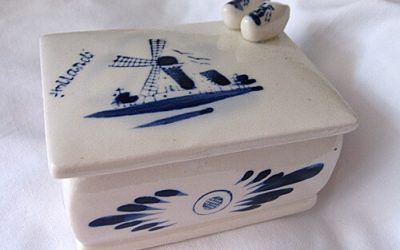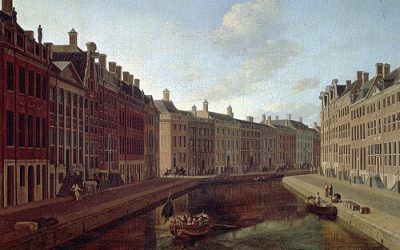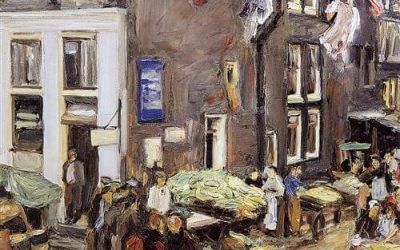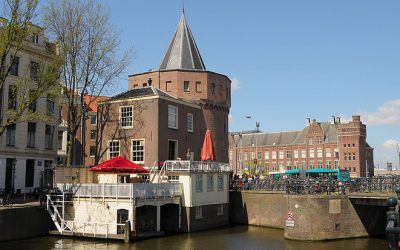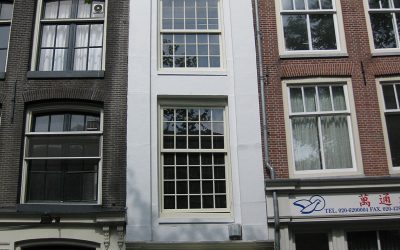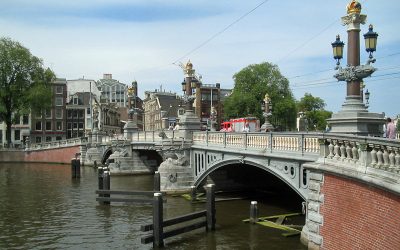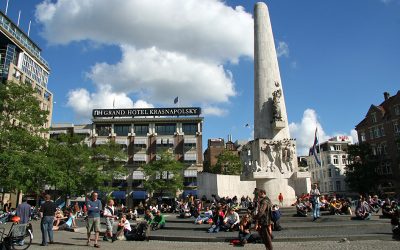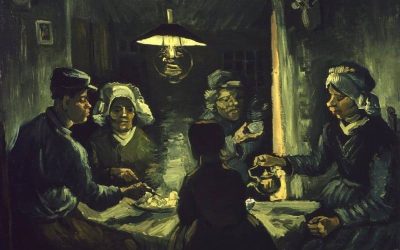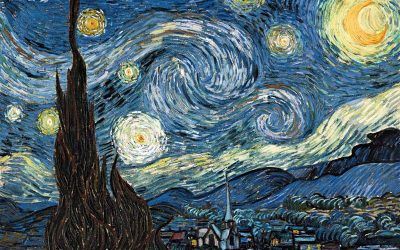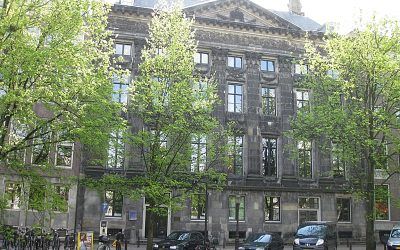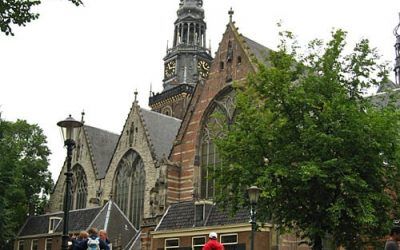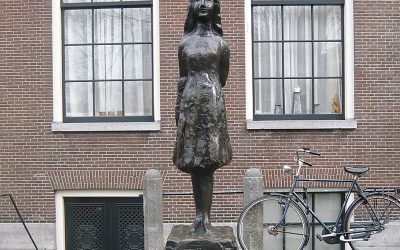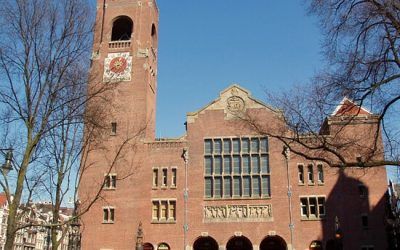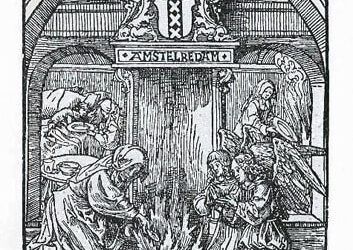The Rich History of Amsterdam
Amsterdam has had a turbulent and rich history. The city developed from a modest fishing village into the capital city of the Netherlands. You will find no boring dates and names of kings on this webpage. But instead interesting and fascinating facts about major events and persons that played an important role in the history of Amsterdam.
Here you will find answers to many questions. Why is Amsterdam also called Mokum? What exactly was the tulip mania in the seventeenth century? Why are Amsterdam onions so famous? What is a millstone ruff?
Amsterdam Museum
Housed in a former orphanage, the Amsterdam Museum tells the story of Amsterdam. The permanent exhibition: Amsterdam DNA, free thinking, entrepreneurship, citizenship and creativity. Apart from the core collection, the Amsterdam Museum hosts temporary exhibitions in...
History of Delftware
Delftware is synonymous with Holland and ubiquitous in souvenir shops – windmills, clogs, kissing farmer boy and girl, vases, mugs, wall plates – they all sell like hotcakes. All souvenir shops in Amsterdam sell this blue-and-white pottery but did you know that this...
The Golden Bend where Wealthy Merchants Lived
Golden bend – Gouden Bocht – that is where the most coveted canal houses in Amsterdam. All these mansions clustered around the curve of Herengracht between Spiegelstraat and Vijzelstraat. This is the stretch of the canal where, in the 17th century, wealthy merchants...
Jewish Amsterdam
Many people refer to Amsterdam as the Venice of the North, a pertinent name for a city with two hundred canals. Few people know Amsterdam’s second name, Mokum, Yiddish for place or town. Mokum is an appropriate name, because the city has welcomed Jews ever since the...
Remnants of Medieval Amsterdam
Amsterdam was founded in 1306, or to be more precise, this is the year in which (probably) city rights were granted (sources on the exact date vary). City rights gave privileges to a city. A city wall could be built, markets held, tolls levied and mint their own...
Narrow Houses and Skinny Facades
Judging by the number of extremely narrow houses along Amsterdam's canals, you could conclude that in the seventeenth century when these houses were built, the locals were very slim. Some of these houses are as narrow as the front door. But why are these houses so...
Rembrandt as Portrait Painter
In the seventeenth century, in Rembrandt's time, photography had not yet been invented and when people wanted their likeness taken, they went to a portrait painter, Rembrandt for example. That is exactly what Marten and Oopjen Soolmans did a year after their wedding....
Best Bridges, Canals and Singel of Amsterdam
Say Amsterdam and the first thing that comes to mind are canals and bridges. No wonder because Amsterdam canals are true eye-catchers. There are about two hundred canals in the city. Originally, the canals were a practical solution to a problematic situation....
Tulip Mania in Seventeenth-century Amsterdam
Tulip mania was a result of greed. In the seventeenth century tulips had become trendy in Amsterdam. Clever speculators stepped in and the commodity markets soared, but their profits were short-lived. One tulip bulb would fetch €2000 (in today's money). This meant...
National Monument Cenotaph on Dam Square
The National Monument on Dam Square is a cenotaph in remembrance of those who fell in the Second World War. The steps of the National Monument are a popular place in Amsterdam to rest, eat a snack or do some people watching. The Remembrance Day ceremony takes places...
Vincent van Gogh and the Potato Eaters
Vincent van Gogh is not only the artist who painted the Potato Eaters, he is also known as the man who cut off his ear, the man who drank turpentine, the man who sold only one painting during his lifetime but became famous posthumously. In 1885, Van Gogh painted...
Best Van Gogh: Paintings, Drawings and Letters
Vincent van Gogh. What does this name mean to you - sunflowers, Starry Night, the painter who cut off his ear or the man who committed suicide? The Van Gogh Museum is one of the most popular museums in Amsterdam. It is home to the art collection of Theo van Gogh,...
Amsterdam Canal House for a Wealthy Merchant: Trippenhuis
Amsterdam canal houses are characterized by narrow fronts. Trippenhuis is an exception to this rule. This seventeenth-century canal house is a typical example of a mansion where a rich merchant lived and the wider the front the wealthier its owner. Trippenhuis was the...
Amsterdam Museum
Housed in a former orphanage, the Amsterdam Museum tells the story of Amsterdam. The permanent exhibition: Amsterdam DNA, free thinking, entrepreneurship, citizenship and creativity. Apart from the core collection, the Amsterdam Museum hosts temporary exhibitions in...
Medieval Amsterdam
Only two medieval houses have survived in Amsterdam. The oldest dates back to 1420, at number 34 Begijnhof. The other one is at number 1 Zeedijk, Tasting House In 't Aepjen. Amsterdam was founded in 1306. To be more precise that is the year city rights were granted....
Amsterdam Honours Anne Frank
Anne Frank was 13 years old when she went into hiding in the annex where she lived with her parents from 6 July 1942 to 4 August 1944, when the family were arrested by the Grüne Polizei and Dutch police officers. Anne Frank probably died in Bergen-Belsen from typhus....
Beurs van Berlage
When walking down Damrak from Centraal Station to Dam Square in Amsterdam, you pass a wine-red brick building, not very elegant, not very inspiring. This building is the Beurs van Berlage, the former Commodity Exchange. Built on reclaimed land, supported by wooden...
Pilgrims in Amsterdam
Each year in March pilgrims flock in their thousands to Amsterdam to take part in de Stille Omgang, a silent procession through the Amsterdam's Old Centre. This procession takes place on 12 March or the first Saturday after this date. The Host Undamaged by the Ashes...
History of Delftware
Delftware is synonymous with Holland and ubiquitous in souvenir shops – windmills, clogs, kissing farmer boy and girl, vases, mugs, wall plates – they all sell like hotcakes. All souvenir shops in Amsterdam sell this blue-and-white pottery but did you know that this...
The Golden Bend where Wealthy Merchants Lived
Golden bend – Gouden Bocht – that is where the most coveted canal houses in Amsterdam. All these mansions clustered around the curve of Herengracht between Spiegelstraat and Vijzelstraat. This is the stretch of the canal where, in the 17th century, wealthy merchants...
Jewish Amsterdam
Many people refer to Amsterdam as the Venice of the North, a pertinent name for a city with two hundred canals. Few people know Amsterdam’s second name, Mokum, Yiddish for place or town. Mokum is an appropriate name, because the city has welcomed Jews ever since the...

